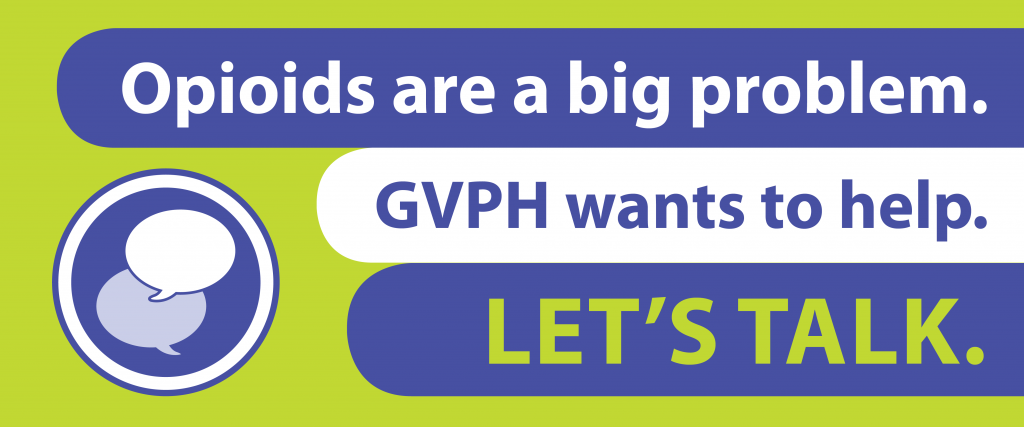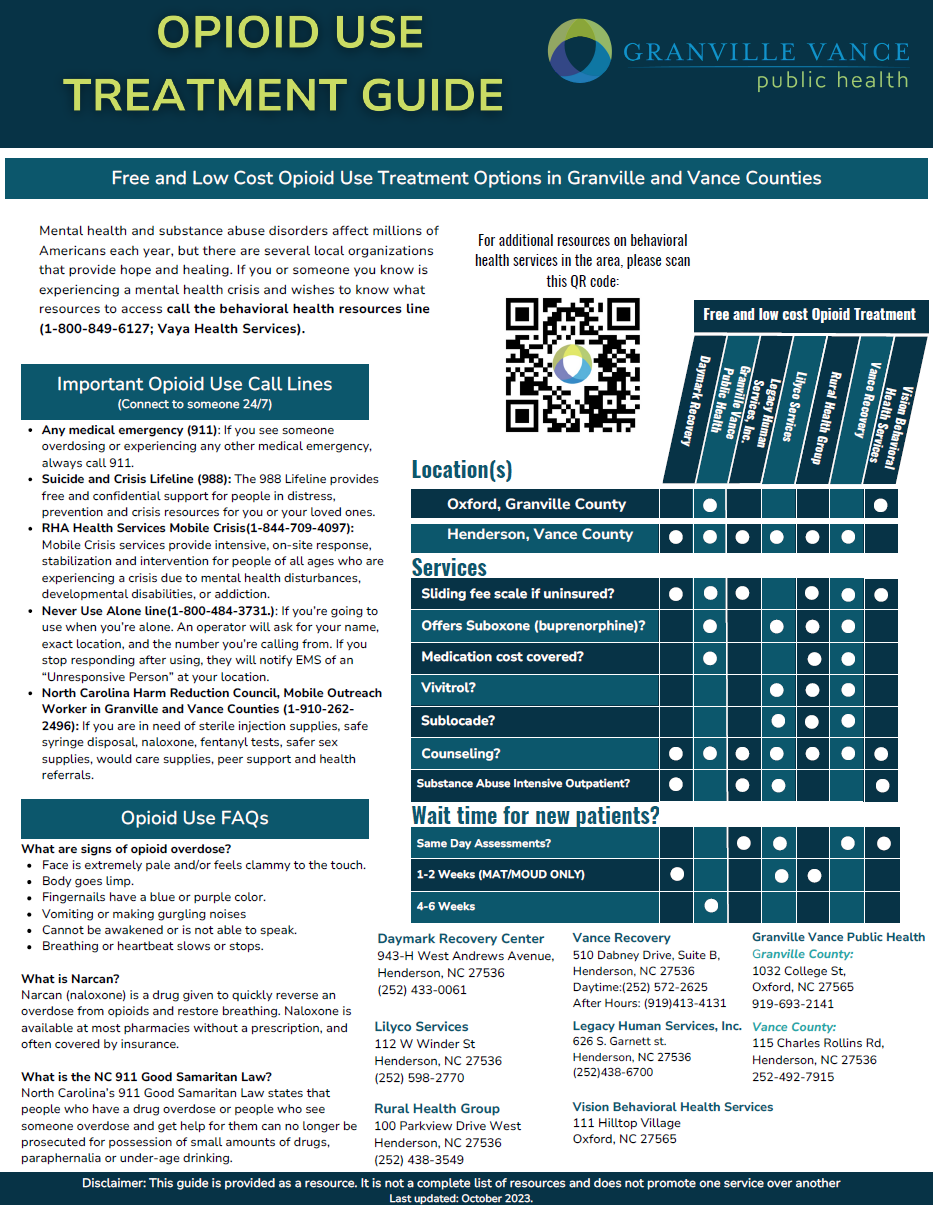MOUD: Medications for Opioid Use Disorder
Mental Health & Substance Use Call-Lines
Get Information about Treatment
Behavioral Health Resources
Primary Care Clinic
Get Naloxone
Take Back Your Prescriptions
Additional Resources
MOUD: Medications for Opioid Use Disorder
Medications for Opioid Use Disorder (MOUD)
Medications for Opioid Use Disorder (MOUD) is an approach to opioid use treatment that combines the use of FDA-approved drugs to reduce cravings and withdrawal symptoms. Along with medications, persons in treatment may participate in counseling, skills development, and other behavioral therapies that have been helpful for people diagnosed with opioid use disorder (OUD). Research shows that a combination of medications and therapy together support long term behavior change.
Mental Health & Substance Use Call-Lines
Behavioral health resources line(1-800-849-6127; Vaya Health Services): If you or someone you know is experiencing a mental health crisis and wishes to know what local resources to access.
Any medical emergency (911): If you see someone overdosing or experiencing any other medical emergency, always call 911.
Suicide and Crisis Lifeline (988): The 988 Lifeline provides free and confidential support for people in distress, prevention and crisis resources for you or your loved ones.
RHA Health Services Mobile Crisis (1-844-709-4097): Mobile Crisis services provide intensive, on-site response, stabilization and intervention for people of all ages who are experiencing a crisis due to mental health disturbances, developmental disabilities, or addiction.
Never Use Alone line (1-800-484-3731.): If you’re going to use when you’re alone. An operator will ask for your name, exact location, and the number you’re calling from. If you stop responding after using, they will notify EMS of an “Unresponsive Person” at your location.
North Carolina Harm Reduction Council, Mobile Outreach Worker in Granville and Vance Counties (1-910-262-2496): If you are in need of sterile injection supplies, safe syringe disposal, naloxone, fentanyl tests, safer sex supplies, would care supplies, peer support and health referrals.
Get Information about Treatment
Behavioral Health Resources
Behavioral and Mental Health Resources
Individual, family and group therapies are available to established primary care patients. Services are provided at both Granville and Vance clinics. Telehealth visits may be arranged after initial visit. Persons wishing to access behavioral health counseling through GVPH must go through the PCP clinic first for a referral.
Collaborative Care services are also available via PCP referral and provide additional support services for patients with behavioral health needs.
For more information, contact:
Karl Johnson, PhD
Behavioral Health Integration Specialist
Kjohnson@gvph.org
Behavioral Health Resources
Mental health and opioid use disorder are two interconnected challenges affecting countless lives. Browse through resources on our Behavioral Health Resources page to find help.
For more information about our latest initiative to improve access to Behavioral health resources check out our THRIVe grant,
here.
Primary Care Clinic
Better Preventive Care: A Primary Care Provider (PCP) provides care that considers a person’s specific needs, family history, and health goals
Routine Screening: Stay informed about preventative screenings like blood pressure, diabetes or cholesterol, and get them in a timely fashion
Fewer Emergency Room Visits: PCPS provide better acute and preventative care, reducing your risk of complications and unnecessary trips to the hospital
Health Education: PCPs know about the latest health recommendations and how to promote food health through a healthy diet and exercise
Referrals: A PCP can provide referrals to specialists.
Informed Decisions: PCPs help you make informed decisions, engaging you every step of the way in your healthcare experience.
Better Diagnoses: A PCP reviews all of your symptoms over time to determine the best course of action for good health.
Get Naloxone
Get Naloxone
Granville Vance Public Health works to ensure that individuals at risk of overdosing on opioids are able to access naloxone – a non-addictive drug that reverses an opiate overdose by binding with opioid receptor in the brain and reversing the depression of the central nervous and respiratory systems.
Naloxone is available at most pharmacies without a prescription, and often covered by insurance. GVPH provides naloxone to anyone that requests it at no cost through our clinics in Oxford and Henderson.
Take Back Your Prescriptions
Take Back Your Prescriptions
Granville Vance Public Health promotes prescription drug take back programs in order to provide safe, convenient and responsible means of disposing prescription drugs, while also educating the public about the potential for abuse of medications that are no longer needed for their originally prescribed purpose. GVPH does not accept old prescriptions. More Powerful NC can help you find a drug take back box near you.
Need a place to return old prescriptions?
Additional Resources
Additional Resources
This page contains information about the NC Opioid Action Plan, NC Harm Reduction Coalition, and resources available to download for more information about community and state initiatives concerning substance use and mental health.
Downloadable Resources
In 2016, Granville Vance Public Health developed the Mental Health & Substance Use Resource Guide to help residents of Granville and Vance counties to better understand and access the organizations within Granville and Vance counties that provide services to individuals dealing with mental health and substance use issues. This guide has been transformed into an interactive online version, found on the Behavioral Health Resources page. In 2019, GVPH developed a pocket guide to provide additional information about local resources. Download this and other resources below.
- This document is intended to provide practical guidance and offer considerations for providing medication for opioid use disorder (MOUD) through a local health department’s primary care or other office-based clinic. It is a product of a collaboration between Granville Vance Public Health (GVPH) and the Duke University Opioid Collaboratory, housed under the Department of Population Health Sciences, and draws upon interviews with providers, staff, and patients.
NC Opioid Action Plan
Granville Vance Public Health has aligned our local efforts to address the opioid crisis with the NC Opioid and Substance Use Action Plan. The plan focuses on four priority areas to address the epidemic: centering equity and lived experiences, preventing future misuse, reducing harm, and connecting individuals to care.
As part of the NC Opioid Action Plan, the state of North Carolina is providing regular data reports on opioid overdoses and other metrics outlined in the plan. Learn more about available metrics and reports and find state and county-level data here.
NC DHHS provides a menu of local actions that has informed our work in our
communities. Granville Vance Public Health has partnered with several county agencies to provide information, education and resources to reduce and prevent overdoses in our community. The VIBRANT Coalition, which stands for Vance Initiates Bringing Resources and Naloxone Training, provides training on overdose prevention and response to individuals at risk of drug overdose and other members of the Granville and Vance County communities.
NC Harm Reduction Coalition
Granville Vance Public Health has partnered with the NC Harm Reduction Coalition to provide local access to naloxone, syringe services programs, and safer sex supplies. Contact information for the local syringe services program is available through NC DHHS here.

![]()

